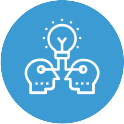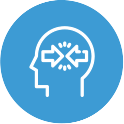Reimagining Education
Education has a higher purpose than just developing knowledge and skills – of enabling children for a purposeful and meaningful living – and that comes with an understanding of the self and the world around.
Preparing the Citizens of Tomorrow
Our education system is a legacy of the First and the Second Industrial Revolutions when the purpose of education was to prepare skilled labour for the factory system. Though automation and technological advancement radically altered the way we work, play or communicate in the Third Industrial Revolution (1960- ), the purpose of education, unfortunately, has remained unchanged in our current system of teaching the young.
Evidence of dramatic changes is all around us already — artificial intelligence, quantum computing, self-driven cars, genetic engineering, sharing economy, 3D printing, to name just a few. In the near future, the all-encompassing technology- and innovation-driven Fourth Industrial Revolution (2010-) will transform current social, cultural and economic structures into a new world order.
The Fourth Industrial Revolution
- Technological revolution that will fundamentally alter the way we live, work and relate to one another
- Technologies that fuse the physical, digital and biological worlds such as the Internet of Things (IoT), 3D printing, Artificial Intelligence (AI), autonomous systems, robotics, materials science, energy storage, nanotechnology and biotechnology
- Transformational impact on all disciplines, economies and industries
- Age of extraordinary creativity, innovation and originality
- Challenging of ideas about what it means to be human
- Social and Creative Intelligence
The implications of this tectonic shift will be immense for education, workspaces, and employment and employability.
New economic, social and institutional models will emerge
Artificial Intelligence will become ubiquitous
New careers
and
opportunities
‘Human’ skills
will be
most valued
Social Intelligence and Creative Intelligence
Social Intelligence

Empathy

PERCEPTIVE COLLABORATION

PERSUASIVE COMMUNICATION

ASSISTING
& CARING

SHARING
Creative Intelligence

INNOVATIVE PROBLEM-SOLVING

CURIOSITY

DEEP
THINKING

PASSIONATE PERSEVERANCE

DIVERSE & INCLUSIVE PERSPECTIVES
These are intrinsically human traits that young children have in abundance. As educators, it is our responsibility to nurture and hone them to ensure that our children thrive in the future. Content is, of course, important. Numeracy and literacy, digital literacy, subject/discipline knowledge as well as learning of processes and skills are critical as they are the basis on which students will be able to evaluate and internalise new and evolving information. However, all this is a means to an end. And the end is to prepare students to become proactive and engaged citizens of the world of the future.
As educators, we are committed to ignite that inner will that will propel children to fulfil their promise as social and creative beings by equipping them with the right knowledge and skills and, primarily, by seeding the right attitude. In a transformed ecosystem of education where learning is no longer confined to schools but available any time and any place, we fulfil our commitment by deploying progressive methodologies and pedagogies as well as by bringing expanded opportunities for learning into the classroom.
